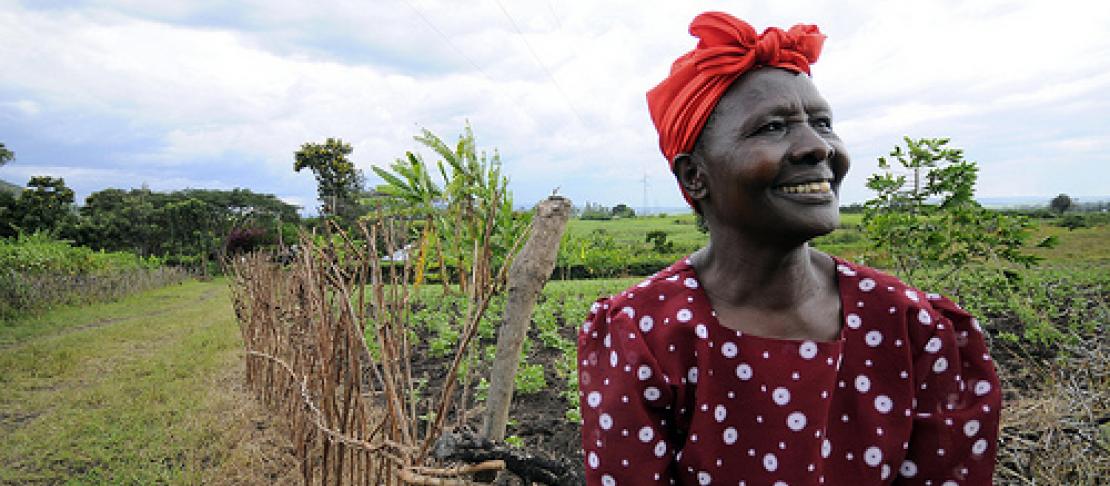Taking action for agriculture: Countdown to Doha

by Cecilia Schubert
In the last few years, great strides have been made towards agriculture’s inclusion on the official climate change policy agenda. Finally, issues related to farming, food and sustainable agriculture have gained recognition, both due to the pressing urgency for adapting farming practices to a changing climate, but also for the potential mitigation benefits. At the upcoming UN climate change meeting (COP18), in Doha later this year, countries will not discuss whether agriculture should be considered in international climate policy, but how it can help to achieve mitigation and adaptation goals.
For those who have not followed the ups and downs of agriculture, here is an update on the history and current position of agriculture in the official climate change negotiations, as well as an analysis of what it would mean for smallholder farmers if a work programme on agriculture were to be established under the UN Framework Convention on Climate Change (UNFCCC).
During the last live streamed Development Briefing, organised by the Technical Centre for Agricultural and Rural Cooperation (CTA) and the CGIAR Research Program on Climate Change, Agriculture and Food Security (CCAFS), representatives from leading agricultural organizations and countries where farming is most at risk, took the stage to discuss climate change, agriculture and food security. One of the presenters, Anette Friis from the Danish Agriculture and Food Council and Coordinator of Farmer’s Organisations, gave a short overview of agriculture in relation to the climate negotiations.
In 2008, parties requested the UNFCCC secretariat to prepare a technical paper on the challenges and opportunities for mitigation in the agricultural sector (PDF), which was finalized later that year. Agriculture was thereafter included in the official UNFCCC meeting agenda during COP15 in Copenhagen, in 2009, where parties tried to work out a formal decision. Even if agriculture was recognized as important in tackling climate change, parties failed to agree on a legally binding agreement. This was repeated the year after, during COP16 in Cancun (PDF), which again failed to produce anything concrete. During COP17 in Durban, parties could only agree to further the discussions, during the Subsidiary Body for Scientific and Technological Advice (SBSTA) in May earlier this year. Here the discussions were heated, but formally, the outcome was a very general one: agriculture is now to be discussed as part of the official COP18 agenda in Doha later this year. Even if no formal decision has been made, the discussions have paved the way for what an agricultural work programme should include and the understanding that agriculture is one of the most vulnerable sectors to climate change.
But one can ask the question - why has agriculture been subject to such political wrangling, seeing as we rely on it for food and nutrition? The main questions lie within the role of agriculture in climate change, and what the work programme should entail. Should only adaptation be included, or should the agreement also encompass mitigation? A few countries support the idea of including adaptation as well as mitigation in a work programme. Other countries, many of them with developing and transitioning economies, are set against mitigation and will only accept adaptation as part of the SBSTA work programme. Some countries fear that by including mitigation, financial resources will flow into mitigating activities and thus ignore adaptation. Other obstacles have included the potential threat that countries will use a binding agreement on agriculture as a barrier to international trade. Read more about this in the article "The 'deal' in Durban: What happened on agriculture at the climate talks?".
According to Anette Friis the successes for agriculture, food security and smallholder farmers that were gained during the United Nations Conference on Sustainable Development, in May of this year, could help inform the work programme, as could the Sustainable Development Goals (PDF). The Rio +20 Declaration "The Future we Want" (PDF) included features such as “extension services, land tenure, women in agriculture, and science”, and recognised the role of sustainable agriculture and smallholders for food security, Anette said.
So what is the most likely outcome for agriculture in the upcoming climate meeting COP18? Watch an interview with Anette Friis, and hear her insights about the challenges to getting agriculture on the official climate agenda:
Agriculture on the agenda: what it means for smallholder farmers
Ishmael Sunga, from the Farmers Organisation Southern African Confederation of Agricultural Unions (SACAU), spoke to the Brussels policy makers about agriculture within the climate negotiations from a farmers’ organisation point of view. Mr. Sunga called for a "work programme for agriculture under SBSTA that covers both adaptation and mitigation to maximise synergies and counter the trade-offs between the two." He continued by explaining that there is also a “need to simplify the financing mechanism put in place within the UNFCCC, especially the Clean Development Mechanism, to make them more accessible to farmers in developing countries.”
There is also the overarching concern, Ishmael Sunga said, that few farmers are involved in the climate process. “It is supposed to be the farmers that are in the center,” he commented “and any policy discussion should include space for farmers’ organisations to speak on the behalf of farmers." Right now, a limited number of farmers and representatives are participating in the negotiations, which is a problem.
According to Ishmael Sunga, a work programme on agriculture would mean that “the quantity and variety of financing mechanisms will open up towards the agricultural sector,” while progress towards greater support of agriculture will ultimately “impact positively on the smallholder farmers.” Watch him talk about what a SBSTA work programme on agriculture would mean for smallholder farmers:
View the the presentations from the Brussels Briefing. The recording is available here: Webcast
This blog post was written by Cecilia Schubert, Communications Assistant, at the CGIAR Research Program on Climate Change, Agriculture and Food Security (CCAFS). To get more updates, follow us on Facebook, and Twitter @Cgiarclimate.